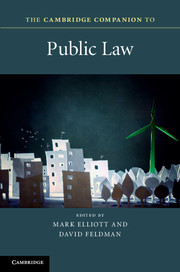Book contents
- Frontmatter
- Contents
- Notes on Contributors
- Introduction
- 1 The distinctiveness of public law
- 2 The politics of public law
- 3 The rule of law in public law
- 4 Legislative supremacy in a multidimensional constitution
- 5 The politics of accountability
- 6 Rights and democracy in UK public law
- 7 Public law values in the common law
- 8 Public law and public laws
- 9 Public law and privatisation
- 10 State architecture: subsidiarity, devolution, federalism and independence
- 11 Soft law never dies
- 12 The impact of public law litigation
- 13 Designing and operating constitutions in global context
- Index
Introduction
Published online by Cambridge University Press: 05 September 2015
- Frontmatter
- Contents
- Notes on Contributors
- Introduction
- 1 The distinctiveness of public law
- 2 The politics of public law
- 3 The rule of law in public law
- 4 Legislative supremacy in a multidimensional constitution
- 5 The politics of accountability
- 6 Rights and democracy in UK public law
- 7 Public law values in the common law
- 8 Public law and public laws
- 9 Public law and privatisation
- 10 State architecture: subsidiarity, devolution, federalism and independence
- 11 Soft law never dies
- 12 The impact of public law litigation
- 13 Designing and operating constitutions in global context
- Index
Summary
This collection of essays explores themes and controversies (legal, political and scholarly) in public law which are subjects of current debate in that area, while also (we hope) contributing to those debates from both practical and theoretical perspectives. The purposes of this Introduction are to set the scene by outlining the political context in which public law and its scholarship have developed over the past forty or so years, and to locate within that context and in relation to each other some of the themes which our contributors develop in the chapters which follow.
The context in which public law develops and operates
At the risk of pre-empting what follows, one can say that public law is concerned with the state – its structures, the actions and interactions of its institutions and people who operate them, the principles and mechanisms on which it runs – and its relationships with other entities and individuals inside and outside the state. These structures and relationships are not static. They change constantly in response to developments in ideas about the role of states in society and to changing political dynamics. Whilst many states are thought to be stable, they are at best maintaining an unstable equilibrium between competing forces, and can easily be tipped out of that equilibrium by unexpected changes. These may be economic or financial, as we saw in 2008 when shocks to the banking system of much of the western world reduced many states to dependency on other states and international organisations. As a result, Greece, Cyprus, Italy, Spain and Portugal, among other states, suffered a severe loss of control over their political as well as economic futures. This may prove to have been only a temporary phenomenon, but it is hard to believe that it will not have a long-term effect on states’ assessments of their own relative independence and authority. Other challenges to states come in the form of political or economic ideologies. Over the last thirty-five years, there have been huge changes in ideas about the state in many countries.
- Type
- Chapter
- Information
- The Cambridge Companion to Public Law , pp. 1 - 16Publisher: Cambridge University PressPrint publication year: 2015
- 2
- Cited by

